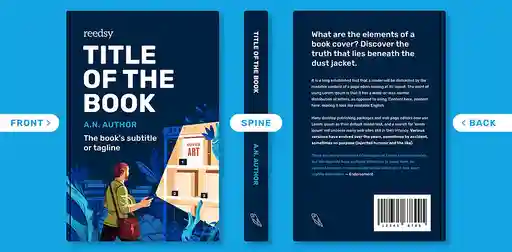Posted on Jun 07, 2023
What Is an Index in a Book? Everything You Need to Know
About the author
Reedsy's editorial team is a diverse group of industry experts devoted to helping authors write and publish beautiful books.
More about the Reedsy Editorial Team →Martin Cavannagh
Head of Content at Reedsy, Martin has spent over eight years helping writers turn their ambitions into reality. As a voice in the indie publishing space, he has written for a number of outlets and spoken at conferences, including the 2024 Writers Summit at the London Book Fair.
View profile →An index is an alphabetical list of important terms, topics, names, and places discussed in a book, along with the pages where they are mentioned. The purpose of the index is to provide a quick and easy way for readers to locate specific information in a book.
It’s typically found at the end of a nonfiction book (as part of the back matter), along with things like the author’s acknowledgments, the glossary, appendix, or bibliography. There’s more to indexes than you might think, so let’s take a closer look at what they do and how they’re created.
An index gives readers a way to navigate your book
Novels tend to be read cover-to-cover, but this isn’t always the case with nonfiction books, especially academic or reference works. Sometimes, you just need a way to dive in and efficiently extract the information you need. That’s where an index comes in, providing you with a map to the book’s content.
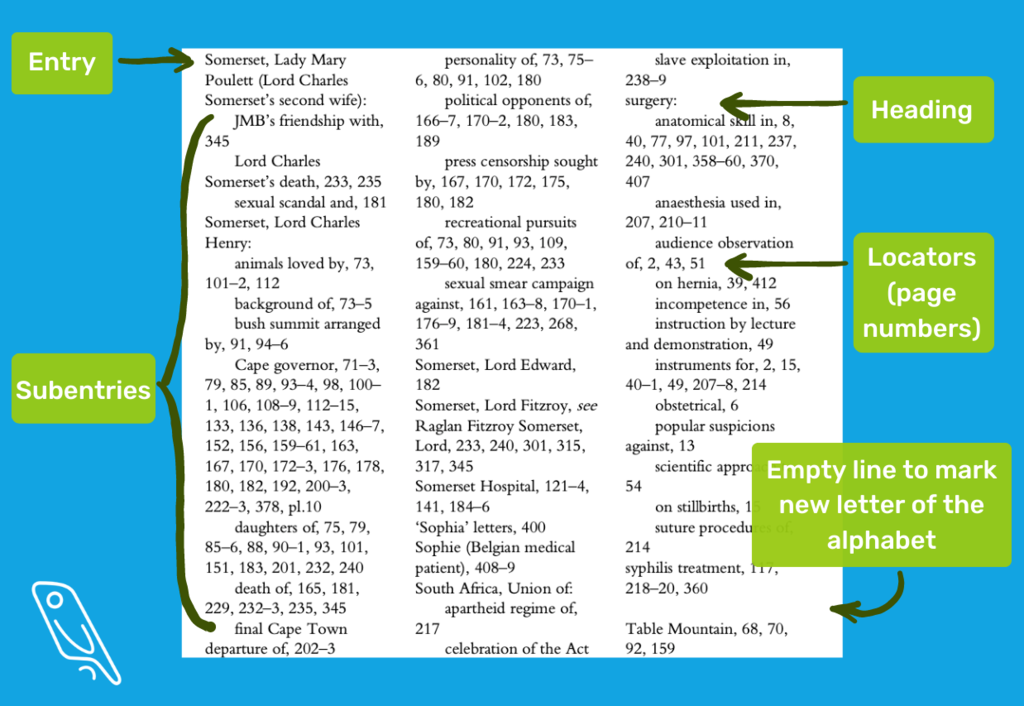
Picture someone searching for information on a specific subject — take historical fiction author Phillip Goodrich, who was writing a novel about the connections between the English court case of Somerset v. Stewart and the American Civil War.
Goodrich might have two piles of books in front of him: books relating to English Court cases and to the Civil War. Without indexes, he’d be forced to read them all cover to cover in hopes of learning about the Somerset case. With indexes, he can quickly check for entries for “James Somerset” and “English Court cases,” or a subentry on “Somerset v. Stewart” — if they’re listed, he can then refer to the page numbers noted.
💡 Read more about how Reedsy helped Phillip Goodrich find success.
Professional indexer and Chartered Institute of Editing and Proofreading member Mark Swift points out that your book becomes more valuable to readers if it has an index. “A well-designed index can help readers have a better connection to your book, making the information contained within more accessible and easier to navigate. It provides the author with an opportunity to highlight the most relevant aspects of the text, and can be a vital tool in enhancing the book’s worth.”
A detailed index is also useful to people who have already read your book. If someone wants ro reference a particular passage in your self-help title, they can look it up in the index and flick straight to that page. Done!
Essential elements of academic publishing
In the academic realm, indexes are absolutely essential. Because of the scale at which academic research is conducted, their presence can make the research process incredibly more efficient, helping identify relevant works quickly. In fact, they’re so important that libraries are unlikely to even shelve academic works that don’t have indexes.
Note: The word “index” originates from Latin, so you may sometimes see the plural as “indices.” Both “indexes” and “indices” are correct. 🤓
Now that we know why indexes are needed, let’s take a peek behind the curtain to see how they’re made.
They are typically created at the end of the process
For an indexer to maintain their sanity, the indexing process is typically the last step in a book’s publishing trajectory, or it happens at the same time as the final proofread, which is unlikely to cause major pagination problems.
Imagine an indexer meticulously combing through a manuscript and noting down important subjects and the page numbers where they are discussed. Then, imagine the author decides to make some revisions that jumble up all the page numbers — noooo!
By the time indexing takes place, the manuscript will have been laid out by a book designer and page numbers finalized, ensuring the accuracy of the indexer’s notes, and the inner peace of anyone working on this book.
MEET BOOK INDEXERS
Get a high-quality index
Don't DIY it — work with a professional to create a useful, accurate book index.
💡 Not sure which order editing rounds tend to happen in? Head over to our post on the different types of editing to find out how it all comes together.
Indexes can be indented or run-in
It doesn’t make a huge difference to readers, but there are actually two ways to format an index: indents and run-in lines.
Indented indexes begin a new, indented line for each new subentry, followed by locators, and look something like this:
Reedsy
founders, 1, 3
self-publishing tips, 2, 5-9, 13-25
weekly writing contest, 28, 31
online learning courses, 44
A run-in index, on the other hand, doesn’t allocate a new line for each subentry, instead clustering them all after the heading and separating them with semicolons. Run-in entries also end in a full stop. Here’s what they look like:
Reedsy: founders of, 1, 3; self-publishing tips, 2, 5-9, 13-25; weekly writing contest, 28, 31; online learning courses, 44.
The run-in format tends to save a lot of vertical space, but can be a little harder to scan. For that reason, it’s more likely to make use of prepositions (e.g., “founders of” instead of “founders”) to make the experience a little more like reading an ordinary paragraph.
Here’s a real example of a run-in index, created by Heather Pendley, member at large and Training Course Administrator of the American Society for Indexing.
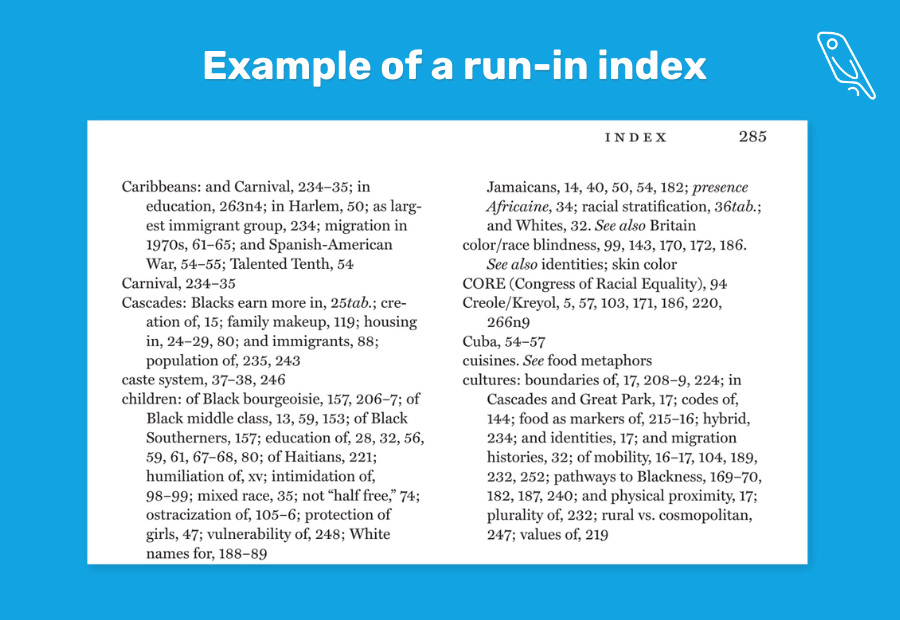
If you take a closer look at the entry for “cultures,” you’ll see that it is indeed followed by a number of prepositions and conjunctions, all there to help you read through it quickly.
💡 Not sure what a preposition and a conjunction is? Time to brush up on your title capitalization skills.
Both formats have their advantages, and the type used in each book is decided by its publisher, who will have an established house style. Regardless of format, an index should aim to add value to a reader’s experience.

NEW REEDSY COURSE
How to Write a Novel
Enroll in our course and become an author in three months.
Indexes should anticipate a reader’s questions
Professional indexers pride themselves on their ability to put themselves in the reader’s shoes, anticipating their questions and potential interests. There is a degree of curation involved in this, with indexes including “See also” or “See” notes (known as cross-references) to let readers know that the topic of their interest is also referenced in pages listed under a different heading.
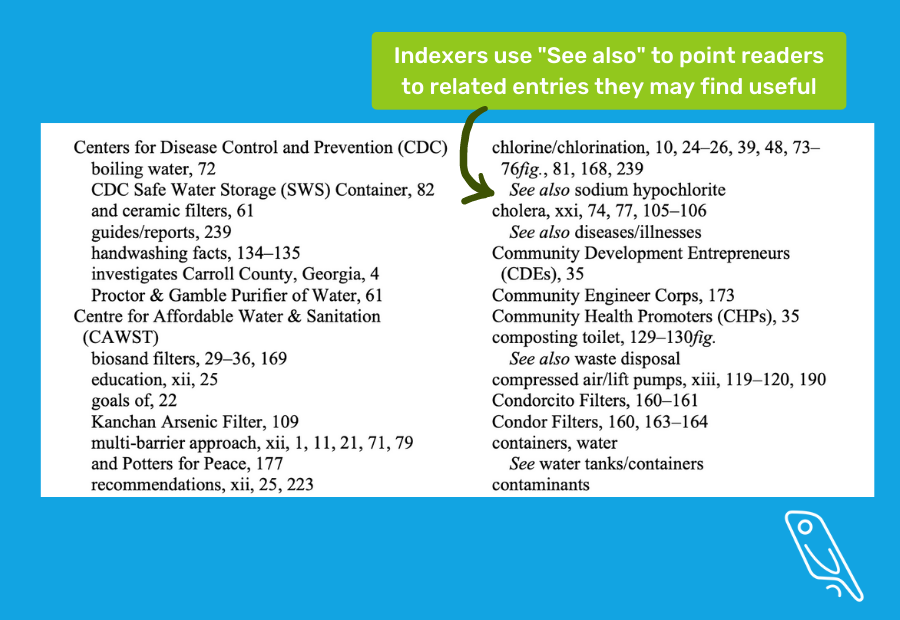
Reedsy’s Heather Pendley (UC Berkeley, Indexing Theory & Application) emphasizes the importance of understanding a book’s content and basing every indexing decision on the readers’ needs: “I think of the best place to list concepts and information if I wanted to find them again later. Indexes are a map of pertinent information in a book and make the text more accessible.”
‘Pertinent’ is an important term many indexers return to when they have to make judgment calls. Professional indexing isn’t just about maximizing the amount of detail — it’s about whittling down an index only to what is important and useful.

FREE FORMATTING APP
Reedsy Studio
Format your manuscript for print or EPUB with a single click.
Indexes require contextual decisions
There’s a delicate balance between thoroughness and conciseness. The longer an index gets, the more unwieldy it becomes, so the process relies on pros using deciding what warrants inclusion and what doesn’t, and how much space a subject deserves.
Take this example from a nonfiction book on philosophy of religion indexed by Reedsy’s Marisa Antonaya, member of the Indexing Society of Canada. Marisa says that this manuscript contained a great amount of information, both in terms of theoretical concepts and people discussed. To keep the index short, she knew she had to ensure that it “did not become a mere outline of the contents, but still reflected all the main ideas and themes presented.”
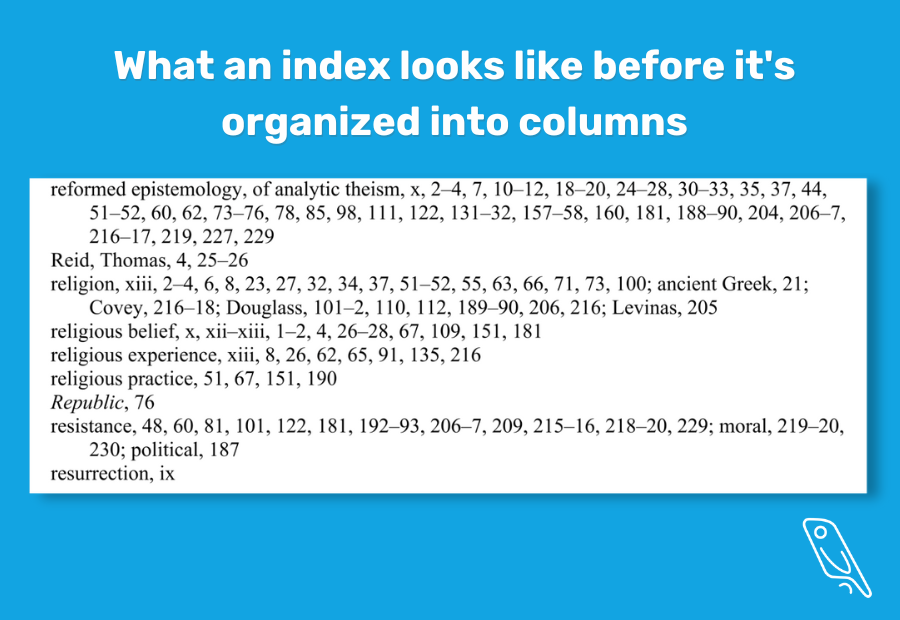
Since this particular book dealt with philosophy and religion, Marisa chose to list “religion,” “religious belief,” “religious experience,” and “religious practice” as separate headings. In another book where religion was a subject mentioned in passing, the latter three subjects would likely have been sub-entries listed below “religion.” Marisa’s decision reflects the specificity and detail with which they are examined in the book.
Anyone should be able to pick up a book and get a representative sense of what it’s going to talk about just by looking at the index. As Marisa puts it, “a reader should be able to skim through the index and come away with a clear idea of the author’s thought process and approach to the subject matter.”
Ultimately, its success always hinges on the skill and insight of the indexer.
Indexing is best left to the professionals
In trade and academic publishing, indexes are created by a professional indexer either manually (using index cards) or with the assistance of specialist organizational software. To compile an index, these pros identify important concepts and make judgment calls about what has to be included or omitted.
Academic publisher Wiley estimates that a 250-page book would take between 25-37.5 hours to index, whereas Harvard University Press estimates 40-50 hours of indexing work for a book of the same length. In other words, a lot of effort and care goes into creating an index, especially if you factor in a lifetime of training.
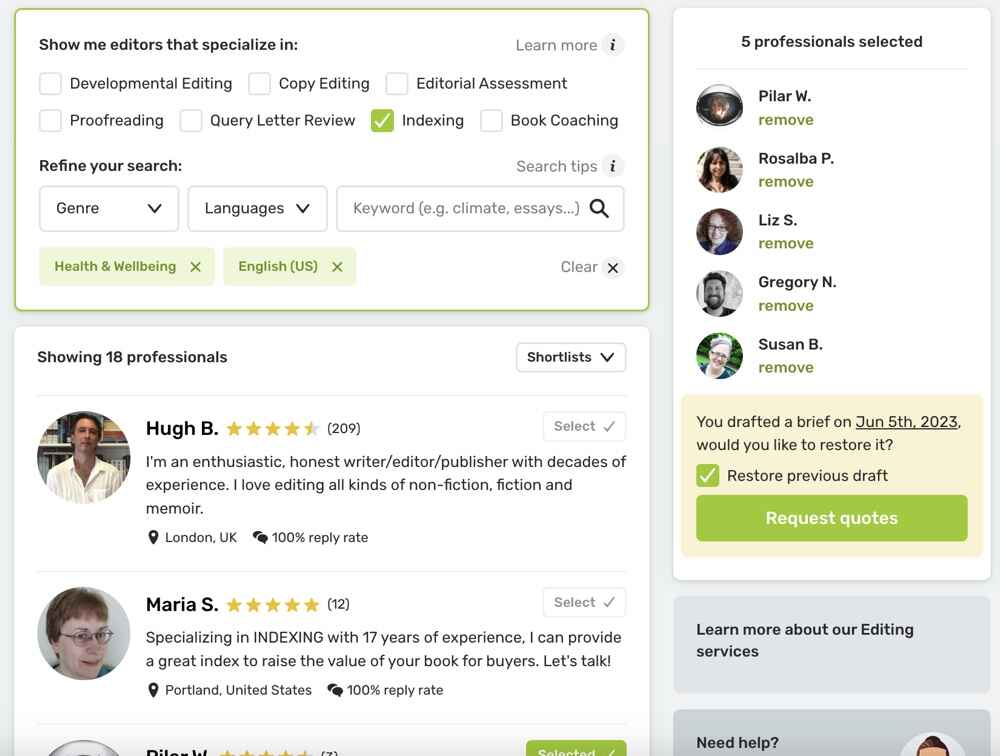
For indexing specialists like Reedsy’s Maria Sosnowski, their value comes from all the work they put in away from the job. “Indexers take courses and attend conferences, go to peer review sessions with other indexers, and hone their craft over years. Many of them have made indexing a second or third career, and bring rich and varied experience to their work.”
The book’s own authors cannot quite match this, despite their familiarity with the material. Maria points out that a professional will bring:
- Objectivity and a fresh eye
- An effective and efficient method developed over years of indexing non-fiction titles to high standards
- Cross-references that guide your readers from their terminology to yours
- Dedicated indexing software that eliminates some of the error-prone issues of the DIY author, such as automated alphabetic sorting, proper formatting of subheadings and cross-reference, and error scans to catch many types of errors
Anyone who respects the skill of an experienced indexer will also understand that auto-generated indexes are very poor substitutes for a real index.
Hire a professional indexer
Sandy B.
Available to hire
I provide back-of-the-book indexing services for non-fiction titles. My indexes are thorough, accurate, and always on time.
Tracy B.
Available to hire
I'm a senior production editor for an academic publisher with 25+ years' experience in copyediting, proofreading, and project management.
Heather P.
Available to hire
Copy/Line Editor│Proofreader │Indexer: 15 years in business specializing in B2B (AWS/Amazon), finance, law, children's, and education.
Auto-generated indexes are also problematic
You can tell when an index has been automated. It will usually be composed of a handful of key terms followed by 50 page numbers. Rather than reading through a book in its entirety and carefully considering its topics, an automated index will simply perform a digital search and list the pages where a term is mentioned. Compare these two examples, one auto-generated, one created by a human:
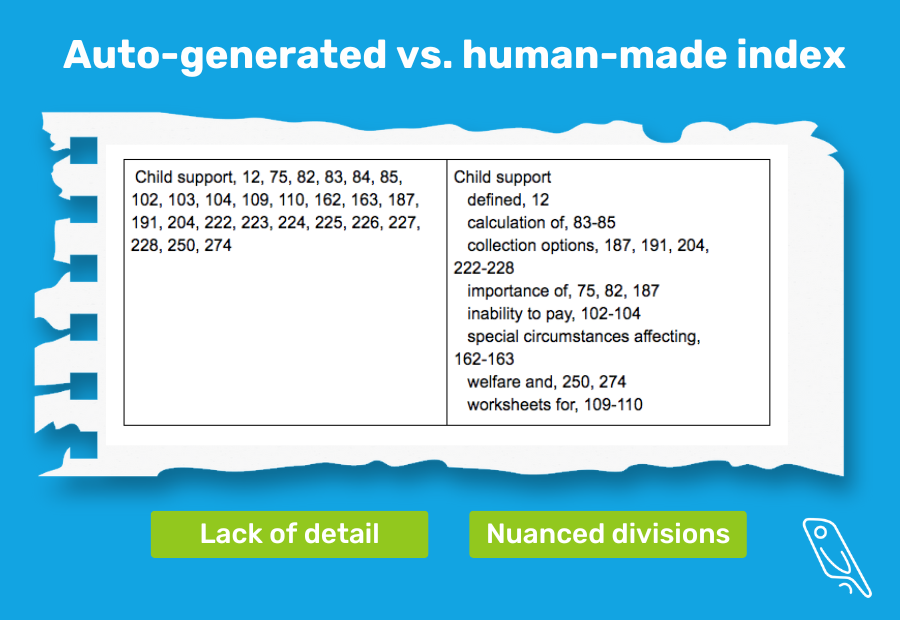 This is in no way comparable to the nuance offered by a real index. As Maria points out, a search function can’t separate the wheat from the chaff. “It can’t distinguish between an in-depth discussion and a passing mention of a term. It doesn’t capture synonyms where multiple words are used for the same concept. It doesn’t capture homographs where the same word has different meanings.
This is in no way comparable to the nuance offered by a real index. As Maria points out, a search function can’t separate the wheat from the chaff. “It can’t distinguish between an in-depth discussion and a passing mention of a term. It doesn’t capture synonyms where multiple words are used for the same concept. It doesn’t capture homographs where the same word has different meanings.
“It doesn’t consider context, either, so it would treat a discussion about Abraham Lincoln just the same as a sentence that uses Lincoln’s term in office to mark the timeline for the real topic.”
One of the reasons human indexers are so good at what they do is that they’re able to empathize with readers in a way that machines, or the authors of the books themselves, aren’t able to. When done well, indexes act as the final cherry on top of a well-written, informative book.
We hope you’ve enjoyed learning about the role of book indexes and learning how much goes on behind the publishing curtain that readers don’t know about. If you want to dive into another aspect of publishing you may not have thought about before, head to our post on poetry book layout next, or simply hop over to our guide on the parts of a book to understand how all of a book’s elements work together.






